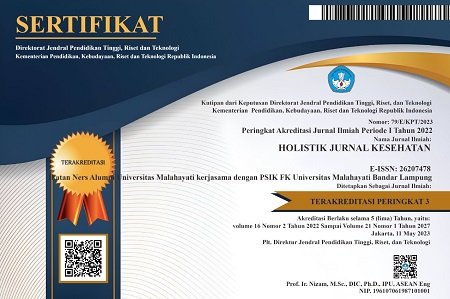Gaya manajemen konflik compromising dan dominating dalam mengurangi stres kerja perawat pelaksana
Abstract
Conflict management styles among nurse managers in general hospitals, Medan-Indonesia
Background: Hospitals are required to improve the quality of health services so they can survive and thrive in the current era of national health insurance. Nurses are the most human resources in hospitals so they are required to have optimal performance. One of the factors that affect performance is conflict that causes work stress. Conflict management is expected to reduce the nurses’working stress.
Purpose: To identify the influence of compromising and dominating conflict management styles to reduce the nurses’working stress.
Method: A quantitative research with a correlative approach and cross sectional research design. The population was nurses at the Imelda Pekerja Indonesia Hospital and Martha Friska Hospital. Sampling using probability random sampling method with simple random sampling technique where the number of respondents was 105 nurses. The instrument used was a questionnaire containing 28 statements for conflict management style and 57 statements to measure the level of nurses’ working stress. Analyze data with bivariate analysis to see the influence of compromising and dominating conflict management styles to reduce the nurses’ working stress where the statistical test used is simple logistic regression (SLR) which is analyzed using a computer program.
Results: Finding that there was an influence of compromising conflict management style to reduce the nurses’working stress (p = <0.001; PR = 1.33 95% CI 1.180-1.516), and there was an influence of conflict management style dominating to reduce the nurses’working stress (p = 0.012; PR = 1.10 95% CI 1.021-1.189)
Conculsion: Compromising and dominating conflict management styles can reduce the nurses’working stress.
Keywords: Conflict Management; Compromising; Dominating; Nurse Managers
Pendahuluan: Rumah sakit dituntut meningkatkan kualitas pelayanan kesehatan sehingga mampu bertahan dan berkembang di era jaminan kesehatan nasional saat ini. Perawat adalah sumber daya manusia yang paling banyak di RS sehigga dituntut untuk memiliki kinerja yang optimal. Salah satu faktor yang mempengaruhi kinerja adalah konflik yang menyebabkan stres kerja. Memanajemen konflik diharapkan mampu mengurangi stres kerja perawat pelaksana.
Tujuan: Untuk mengidentifikasi pengaruh gaya manajemen konflik compromising dan dominating dalam mengurangi stres kerja perawat pelaksana.
Metode: Penelitian kuantitatif dengan pendekatan korelatif dan desain penelitian cross sectional. Populasinya perawat pelaksana di RS Imelda Pekerja Indonesia dan RS Martha Friska. Pengambilan sampel menggunakan metode probability random sampling dengan teknik simple random sampling dimana jumlah responden sebanyak 105 orang perawat pelaksana. Instrumen yang digunakan berupa kuesioner yang berisi 28 pernyataan untuk gaya manajemen konflik dan 57 pernyataan untuk mengukur tingkat stres kerja perawat pelaksana. Analisa data dengan analisis bivariat untuk melihat adanya pengaruh gaya manajemen konflik compromising dan dominating dalam mengurangi stres kerja perawat pelaksana dimana uji statistik yang digunakan adalah simple logistic regression (SLR) yang dianalisis dengan menggunakan program komputer.
Hasil: Didapatkan bahwa terdapat pengaruh gaya manajemen konflik compromissing terhadap stres kerja perawat pelaksana (p=<0,001;PR = 1,33 95%CI 1,180-1,516), dan terdapat pengaruh gaya manajemen konflik dominating terhadap stress kerja perawat pelaksana (p=0,012;PR = 1,10 95%CI 1,021-1,189)
Simpulan: Gaya manajemen konflik compromising dan dominating kepala ruangan berpengaruh dalam mengurangi stres kerja perawat pelaksana.
Keywords
Full Text:
PDFReferences
Al Rasasi, A., Al Faisal, W., El Sawaf, E., Hussain, H., & Wasfy, A. (2015). Work-Related Stress Among Nurses Working in Dubai, a Burden for Healthcare Institutions. Am J Psychol Cogn Sci, 1(2), 61-5.
Al‐Hamdan, Z., Shukri, R., & Anthony, D. (2011). Conflict management styles used by nurse managers in the Sultanate of Oman. Journal of clinical nursing, 20(3‐4), 571-580.
Baharudin, B., Kurdi, F. N., & Lionardo, A. (2015). Analisis Perbedaan Tipe Kepribadian A dan B Terhadap Manajemen Konflik Interpersonal Pada Pegawai Rumah Sakit Khusus Mata Provinsi Sumatera Selatan. Psikis: Jurnal Psikologi Islami, 1(2), 25-33.
Cavanagh, S. J. (1991). The conflict management style of staff nurses and nurse managers. Journal of advanced nursing, 16(10), 1254-1260.
DuBrin, A. J., & Geerinck, T. (2015). Human relations: Interpersonal, job-oriented skills. Pearson.
Farquharson, B., Bell, C., Johnston, D., Jones, M., Schofield, P., Allan, J., & Johnston, M. (2013). Nursing stress and patient care: real‐time investigation of the effect of nursing tasks and demands on psychological stress, physiological stress, and job performance: study protocol. Journal of advanced nursing, 69(10), 2327-2335.
Fernando, M., Mihardjo, A. I., & Widjaja, D. C. (2018). Analisis pengaruh gaya manajemen konflik terhadap kinerja karyawan di hotel sheraton surabaya. Jurnal Hospitality dan Manajemen Jasa, 6(2).
Gross, M. A., & Guerrero, L. K. (2000). Managing conflict appropriately and effectively: An application of the competence model to Rahim's organizational conflict styles. International journal of conflict management, 11(3), 200-226.
Halimsetiono, E. (2014). Peningkatan komitmen organisasi untuk menurunkan angka turnover karyawan. Kesmas: National Public Health Journal, 8(8), 339-345.
Huan, L. J., & Yazdanifard, R. (2012). The difference of conflict management styles and conflict resolution in workplace. Business & Entrepreneurship Journal, 1(1), 141-155.
Kementerian Kesehatan Republik Indonesia. (2014). Permenkes, R. I. Nomor 56 tahun 2014 tentang Klasifikasi dan Perizinan Rumah Sakit. Jakarta: Depkes Republik Indonesia.
Kunaviktikul, W., Nuntasupawat, R., Srisuphan, W., & Booth, R. Z. (2000). Relationships among conflict, conflict management, job satisfaction, intent to stay, and turnover of professional nurses in Thailand. Nursing & health sciences, 2(1), 9-16.
Moisoglou, I., Panagiotis, P., Galanis, P., Siskou, O., Maniadakis, N., & Kaitelidou, D. (2014). Conflict management in a Greek public hospital: Collaboration or avoidance. International journal of caring sciences, 7(1), 75-82.
Odoziobodo, S. I. (2015). Integrity and conflict resolution in Nigeria: An analysis of trade disputes between the Federal Government of Nigeria and the academic staff union of universities, ASUU. European Scientific Journal, 11(22).
Prause, D., & Mujtaba, B. G. (2015). Conflict management practices for diverse workplaces. Journal of Business Studies Quarterly, 6(3), 13.
Rahim, M.A. (2002). Toward a theory of managing organizational conflict. International journal of conflict management, 13(3), 206-235.
Ramadhanta, A. (2017). Pengaruh Gaya Manajemen Konflik Kolaborasi, Menghindar, Kompetisi, Akomodasi dan Kompromi terhadap Kinerja Karyawan dengan Stres Kerja Sebagai Variabel Intervening di RS PKU Muhammadiyah Yogyakarta (Doctoral dissertation, Universitas Islam Indonesia).
Rawal, C. N., & Pardeshi, M. S. A. (2014). Job stress causes attrition among nurses in public and private hospitals. IOSR Journal of Nursing and Health Science, 3(2), 42-47.
Redmond, V., Jameson, J. K., & Binder, A. R. (2016). How superior–subordinate relationship quality and conflict management styles influence an employee's use of upward dissent tactics. Negotiation and Conflict Management Research, 9(2), 158-176.
Robbins, S. P, & Judge, T. A (2015). Perilaku Organisasi. Jakarta: Salemba Empat, edisi ke-6
Sasumba, A. (2017). Gambaran stres kerja perawat di ruang rawat bedah rsud wates (Doctoral dissertation, STIKES Jenderal Achmad Yani Yogyakarta).
Toren, O., & Wagner, N. (2010). Applying an ethical decision-making tool to a nurse management dilemma. Nursing Ethics, 17(3), 393-402.
DOI: https://doi.org/10.33024/hjk.v13i4.1841
Refbacks
- There are currently no refbacks.
Copyright (c) 2019 Holistik Jurnal Kesehatan

This work is licensed under a Creative Commons Attribution-NonCommercial 4.0 International License.














